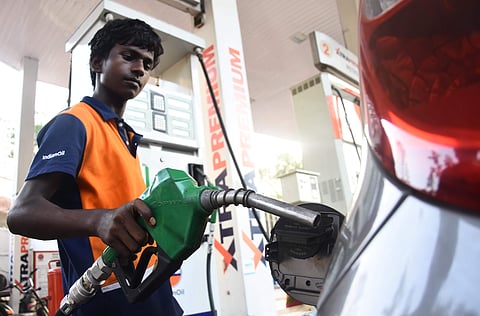

A little over a week ago, retail petrol and diesel prices had touched a record high after being jacked up for 16 days continuously. The overall hit imposed was between Rs 3.40 and Rs 4.00 per litre cutting deep into the common man’s pockets. With India importing 80 per cent of its petroleum products, Indian Oil Corporation (IOC) and the other oil companies blame the hikes on the creeping increase of crude oil to $80 a barrel in international markets.
Then, crude prices began to ease and came down to around $75 a barrel. IOC cut prices by about 60 paisa a litre, only to say it was a ‘clerical error’. The real cutback was 1 paisa a litre. Expectedly, the public reaction was derisive. Social media dubbed the NDA government as the ‘Ek Paisa ki Sarkar’. BJP ally Nitish Kumar’s JD(U) party even blamed the drubbing the NDA alliance got in the bye-elections in 10 states on the continuous fuel hikes!
There is simmering anger building up. The Central and state value-added tax (VAT) on diesel and petrol are in excess of 50 per cent, the highest in the world. People are asking: Why are fuel prices touching record highs when international crude is at $80? Even in 2008, when international crude had touched $147 a barrel, fuel prices at home were not so high?
From June last year, the 15-year old practice of revising rates on 1st and 16th of every month was dumped in favour of a more dynamic formula of daily revision based on international prices.
DOUBLE STANDARDS
When it comes to real politicking, these principles of prudent economic practice are given the go by. For instance, recently, just before Karnataka went to the polls, for a fortnight there was no rise in fuel prices from 24 April onwards, though international crude went up by about $2 a barrel. Again, to give the government a few brownie points before the Gujarat election in December last year, the oil companies reduced fuel prices every day for around a fortnight, without reference to changes in the price of international crude.
But people don’t have such short memories. They do remember being short-changed when international crude prices were plummeting in the 2014-16 period. From November 2014 to January 2016, the BJP government raised excise duty nine times. In August 2015, in fact, for the first time since 2009, crude oil fell to below $40 a barrel, but the benefits were not passed on to the people. It was only once — in October 2017 — excise duty was cut by Rs 2 a litre. The only gainer from falling crude prices of that period was the government who raked in Rs 2.42 lakh crore in FY17, more than double the excise collection of `99,000 crore in FY15.
By the same principle, the Centre and states, who had raised taxes during the downward movement of international crude, should have cut taxes to hold the price line. But, what is sauce for the goose is not sauce for the gander!
KERALA EXAMPLE
In this respect, the Kerala government’s pioneering move to cut taxes must be lauded. The state imposes about 32 per cent tax on petrol and a little less than 26 per cent on diesel. On 30 May, the Left Front government bit the bullet and cut state taxes to reduce the price of diesel and petrol by Rs 1 a litre from June 1. With this measure, the state exchequer will lose Rs 509 crore annually. It is also an invitation for the Centre to reciprocate, but will it?
The average states’ VAT on fuel is a whopping 27 per cent, the highest being Mumbai at over 39 per cent. A 3-4 per cent reduction in VAT is not going to make the heavens fall. The Union government’s defence has been that every rupee of reduction in excise duty will mean foregoing Rs 13,000 crore in annual revenue.
These arguments don’t wash. Petrol and diesel are essential lifelines. To milk them for tax revenue is not in consonance with running a welfare state. It is for this reason — to have the flexibility to juice out the maximum possible — that the government has not merged fuel taxation with the Goods and Services Tax (GST) regime. It is about time that a rational tax structure is worked out for fuel that will protect harried consumers against the vagaries of changing international crude prices.